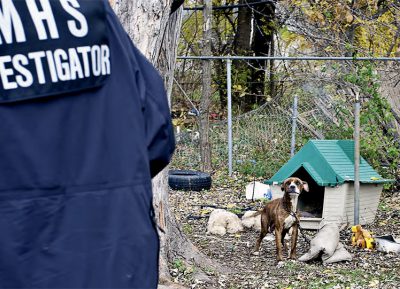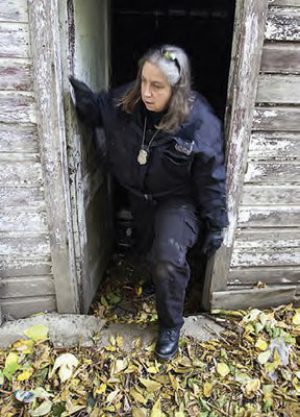Investigators of animal cruelty are educators as well as investigators

THE MSU SHELTER Medicine Program will provide veterinary students opportunities to work with the Cruelty Investigation Department at the Michigan Humane Society. One of the largest of its kind, the seven-person investigation team responds to more than 5,000 cases each year.
“Cruelty investigations and forensics is one of the Michigan Humane Society’s strengths that is pretty unique,” says Christopher Brown, dean of the College.
“The volume and diversity of cases they respond to will provide MSU students experience that would not be available in most places.”
The MHS cruelty investigation team sees everything from underfed pets to largescale dog-fighting and cock-fighting operations and neglected horses. The team includes Shirene Cece (DVM ’81)‚ supervising veterinarian for the Veterinary Center at the MHS Detroit Center for Animal Care, who examines and treats animals that are rescued from abusive or neglectful situations. Her work includes the forensics component of examining deceased animals to determine cause of death.
The veterinary component of forensics is a particular strength of the College’s partnership with MHS, and will provide opportunities for students new to forensics and those with some experience.

“I worked as an animal control officer before veterinary school, and I helped conduct cruelty and neglect investigations as part of that,” says Jillian Chase (’17), secretary of the Student Association of Shelter Vets Club. “But last semester we had a great presentation on veterinary forensics, and it was fascinating to see the veterinary side of cruelty investigations.”
MHS cruelty investigators are educators as well as investigators. The team regularly speaks with animal owners about maintaining health and safety and presents at cruelty investigation professional development events nationwide.
The investigators also play an integral role in collaborative efforts to prosecute cruelty cases. Collaborative teams may include local and federal law enforcement, the prosecutor’s offices and the special Animal Protection Unit in the prosecutor’s office, advocates in the judicial system, Detroit Animal Control, and concerned citizens.
“We didn’t always get the happy ending that I wanted,” says Chase of her time as an animal control officer. “But when you get to see justice served—and be a part of it—everything else seems worth it.”
Carrying on a legacy
MSU STUDENTS in the shelter medicine program will be part of the MHS legacy that extends from the beginnings of the welfare movement in the United States up until the current economic, humanitarian, and animal welfare crisis in Detroit.
MHS WAS LAUNCHED in 1877 with two purposes: to protect humans from cruelty, abuse, and oppression; and to protect animals. In its first three months, it provided relief to three elderly people, 68 women, and 189 children.
MHS no longer includes human welfare in its mission, but does work to promote humane values. The link between animal cruelty and other crimes is now well documented. Animal fighting—cock and dog—are linked to drug and gun crimes, and animal abuse is often a component of domestic violence and an early crime of individuals who become abusers, pedophiles, and serial killers.
“Cruelty investigation and forensics opportunities are part of providing students first-hand experience in animal welfare issues and also to opportunities available in shelter medicine,” says Brown. “These are important things for students to know about, no matter what course their careers take. That includes awareness on the part of all our graduates of the signs of animal abuse—and knowing how that might be connected to other issues in the household.”
December 2013
Casey Williamson
